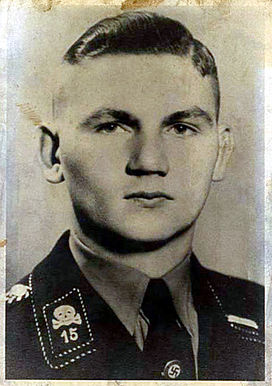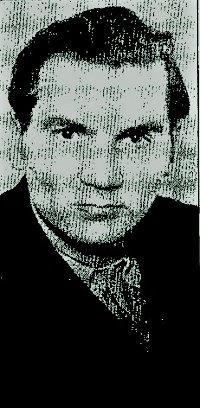Over 55,000 prisoners of the Buchenwald Concentration Camp never made it out alive. Buchenwald was one of the Third Reich’s largest camps, with over 280,000 prisoners serving time there.
Death lurked around every corner, and many killings were never recorded in the camp’s books.
Walter Gerhard Mart Sommer, who earned the title “The Hangman of Buchenwald,” stood out among the many depraved guards. The Nazi government investigated him for the excessive amount of cruelty he showed.

Early Life
Martin Sommer was born on February 8, 1915, to a farming family in Schkölen. An early adherent of Naziism, he joined the party at 16 in 1931 before joining the SS in 1933.
By 1943 he was an SS Hauptscharfuhrer at Buchenwald after a brief stint at the Sachsenhausen concentration camp.
At Buchenwald
Sommer’s natural sadism had free reign when he was promoted to the Chief Penal Officer of Buchenwald.
His preferred method of torture was to tie prisoners’ arms behind their backs and then hang them a few inches off the ground until their arms dislocated. This practice earned him the nickname “the Hangman of Buchenwald.”
The camp’s surrounding area became known as the “singing forest” due to the screams of prisoners subjected to this cruel torture.

Sommer kept a secret stash of torture instruments in his office under his floorboards, including needles to inject victims with carbolic acid or air to cause an embolism.
These sessions were unsanctioned, so Sommer often had to hide his victim’s bodies under his bed for later disposal.
Like other concentration camps, floggings were a common punishment at Buchenwald. Sommer forced prisoners to count the strikes of the whip aloud. If they lost count, he would start over.
Knowing that more than 25 lashes could be fatal, Sommer often exceeded the prescribed number.

Particular Hatred for the Clergy
Sommer especially hated members of the clergy. His most famous crime was the execution of Austrian priests Otto Neururer and Mathias Spannlang. Both were crucified upside down.
In another case, Sommer hung a German pastor naked outside in the winter, splashing water on him until he froze. On another occasion, he fatally beat a Catholic priest for performing the Sacrament of Penance for a fellow inmate.
Under Investigation
One fascinating component of the Nazi Regime was its glaring contradictions. Murder, torture, and cruel medical experiments were fair game if they followed official Nazi policy. If you stepped outside those bounds, you would run into problems.
In 1943, SS judge Georg Konrad Morgen was appointed by Heinrich Himmler to investigate allegations of cruelty and corruption at the Buchenwald camp.
Sommer and his boss Commandant Karl Koch were brought to trial. He was tried for embezzlement committing unsanctioned murders. After initially denying his crimes, he eventually admitted to 40 to 50 unreported killings.
Sommer received a probationary sentence after the trial and was sent to the front lines.
On April 8, 1945, an American bomber plane carrying a full payload crashed close to his tank, and Sommer was gravely wounded, sustaining injuries to his left arm, right leg, and stomach.
The damage to his left arm and right leg was so severe that both had to be amputated.
Retrial and later life
Sommer was taken into custody by American occupation authorities after recuperating from his injuries due to his SS affiliation. He kept his true identity hidden, evading a probable capital punishment in the Buchenwald trial.
He was eventually identified by a former prisoner, resulting in his detention in February 1950. Nevertheless, the charges were initially dismissed because of his injuries from the war.

After being released, Sommer went back to West Germany, where he got married, had a child, and applied for a pension due to his service-related disabilities.
In 1957, he was charged with involvement in the deaths of 101 concentration camp inmates. In July 1958, he was sentenced to life imprisonment.
Sommer was released from jail in 1971 since there was no appropriate facility to continue his medical treatment for his wartime injuries. Instead, he was transferred to a hospital and then to a nursing home, where he stayed until his passing in 1988.

